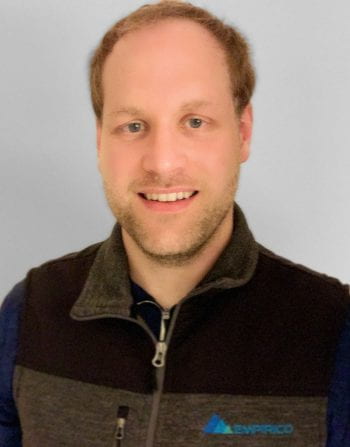
On May 8th we had WashU Alum, Dr. PJ Buske. Dr. Buske graduated from the (now) Biochemistry, Biophysics, and Structural Biology program in 2013, then did his postdoc in the lab of Dyche Mullins at UCSF, both times working on bacterial cell biology. In 2017, he transitioned to industry and joined the Bioanalytical group as a Scientist at MedImmune (now a fully integrated part of AstraZeneca). After 2 years, Dr. Buske found his current position at the start-up biotech Empirico, where he is the Director of In Vitro Model Systems.
Q: What can you do in industry?
A: There are lots of different types of industry:
- Discovery: finding the drugs which could be effective
- Pre-clinical: testing the discovery-found drugs for efficacy, decay time, determining mechanism of action,etc
- Translational/Clinical: working with human patients to test the drug
- Non-lab roles like statistician, project manager, study coordinator
Q: What types of industry positions are open for PhDs?
A: There are many research positions, depending on your skills and interest. I applied for a job as the sort of head of a microscopy unit since I had a lot of experience in microscopy. When I interviewed, they asked me where I saw myself in 5 years – what they meant was if I wanted to focus solely on microscopy or if I was interested in learning other skills and moving upward to a position where I managed others as part of my own research group. Both of these were viable options; for me, I wanted to move upward.
Q: What is the timeline like in industry compared to academia?
A: Industry timelines are a lot faster than academia. There are financial stakeholders who expect output, whether they be VCs funding startups or stockholders of large companies. The major difference is that you aren’t tied to a grant, so, if your data doesn’t look promising then you have to switch gears.
Q: What is the hardest part in industry compared to academia?
A: The number of projects you are expected to work on at the same time and the rate at which you work on them. You are expected to get results much faster and projects both change direction and start and stop at a rapid pace. You will have multiple projects going at once, and they’ll all be at different stages. You’ll be flipping back and forth; day to day, week to week. While this is difficult, it also gives you the opportunity to learn new things all the time. Each project requires a different subset of knowledge and with each turn you’ll need to learn more.
Q: You went from a large company to a small start-up. Was that a conscious decision?
A: It was all circumstance. We were in the San Francisco Bay Area and looking to move back to the Midwest. Companies in the Midwest will generally be smaller. The most important thing is if the company is a good fit for you. The hardest part is getting your foot in the door.
Q: How do you get that foot in the door?
A: Talk to people – as many as you can. In grad school, I recommend looking for connections and experience. An internship is a great way to learn if industry is right for you, and it also looks great on your resume. If you’re a postdoc, use the career center to help you write your CV, cover letter, and interview. Go to talks given by someone in industry and use the same types of language when you write.
Q: How do you write a cover letter and CV for industry when you don’t have much industry experience?
A: In my current role I have hiring power and there are different requirements for people with different degrees. For example, things that stand out for someone with a BS/MA are the skills and personality. On the other hand, I expect a PhD to have skills, but more importantly be able think critically. PhDs are expected to pick up the skills needed, so they don’t necessarily need to come in with them. For example, if you’re a fly geneticist applying for a job in cancer biology, I wouldn’t want to see fly genetics at the top, but rather how you could apply your geneticist skills to cancer biology. Make the skill you do have stand out for the job.
Q: What piece of advice would you give a graduate student?
A: Be a bit self-serving. Reach out to someone who knows someone else or knows how to do something you want to know, whether a technical skill or daily life at a company. We’re a community of scientists and most people are happy to answer questions, at the least.
Q: What if you want to apply to a position in a field you’ve never studied before. Is that a problem?
A: Not at all. You can always catch up by reading the literature. The company will also help you learn what you need to know. What is most important is that you do your homework on the job – read up on their postings even if you aren’t currently looking. You can see the type of skillset they are interested in.